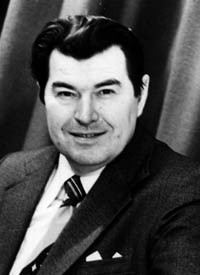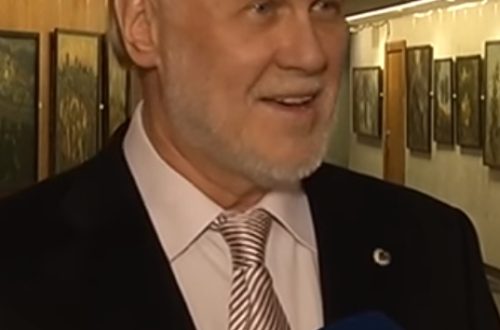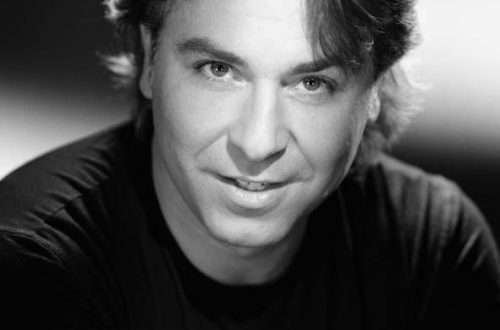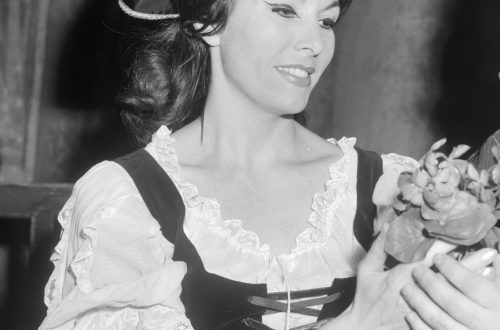
Boris Shtokolov |
Boris Shtokolov

Boris Timofeevich Shtokolov was born on March 19, 1930 in Sverdlovsk. The artist himself recalls the path to art:
“Our family lived in Sverdlovsk. In XNUMX, a funeral came from the front: my father died. And our mother had a little less than us … It was difficult for her to feed everyone. A year before the end of the war, we in the Urals had another recruitment to the Solovetsky school. So I decided to go to the North, I thought it would be a little easier for my mother. And there were a lot of volunteers. We traveled for a long time, with all sorts of adventures. Perm, Gorky, Vologda… In Arkhangelsk, recruits were given uniforms – overcoats, pea jackets, caps. They were divided into companies. I chose the profession of a torpedo electrician.
At first we lived in dugouts, which the cabin boys of the first set equipped for classrooms and cubicles. The school itself was located in the village of Savvatievo. We were all adults then. We thoroughly studied the craft, we were in a hurry: after all, the war was ending, and we were very afraid that the volleys of victory would take place without us. I remember with what impatience we waited for practice on warships. In the battles, we, the third set of the Jung school, were no longer able to participate. But when, after graduation, I was sent to the Baltic, the destroyers “Strict”, “Slender”, the cruiser “Kirov” had such a rich combat biography that even I, who did not fight a cabin boy, felt involved in the Great Victory.
I was the company leader. In drill training, in sea voyages on sailboats, I had to be the first to tighten the song. But then, I confess, I did not think that I would become a professional singer. Friend Volodya Yurkin advised: “You, Borya, need to sing, go to the conservatory!” And I waved it off: the post-war time was not easy, and I liked it in the navy.
I owe my appearance on the big theater stage to Georgy Konstantinovich Zhukov. It was in 1949. From the Baltic, I returned home, entered the special school of the Air Force. Marshal Zhukov then commanded the Urals Military District. He came to us for the graduation party of the cadets. Among the numbers of amateur performances, my performance was also listed. He sang “Roads” by A. Novikov and “Sailor’s Nights” by V. Solovyov-Sedogo. I was worried: for the first time with such a large audience, there is nothing to say about distinguished guests.
After the concert, Zhukov told me: “Aviation will not be lost without you. You need to sing.” So he ordered: to send Shtokolov to the conservatory. So I ended up at the Sverdlovsk Conservatory. By acquaintance, so to speak … “
So Shtokolov became a student of the vocal faculty of the Ural Conservatory. Boris had to combine his studies at the conservatory with evening work as an electrician in the drama theater, and then as an illuminator at the Opera and Ballet Theatre. While still a student, Shtokolov was accepted as an intern in the troupe of the Sverdlovsk Opera House. Here he went through a good practical school, adopted the experience of older comrades. His name first appears on the poster of the theater: the artist is assigned several episodic roles, with which he does an excellent job. And in 1954, immediately after graduating from the conservatory, the young singer became one of the leading soloists of the theater. His very first work, Melnik in the opera Mermaid by Dargomyzhsky, was highly appreciated by reviewers.
In the summer of 1959, Shtokolov performed abroad for the first time, winning the title of laureate of the International Competition at the VII World Festival of Youth and Students in Vienna. And even before leaving, he was accepted into the opera troupe of the Leningrad Academic Opera and Ballet Theater named after S.M. Kirov.
The further artistic activity of Shtokolov is connected with this collective. He is gaining recognition as an excellent interpreter of the Russian operatic repertoire: Tsar Boris in Boris Godunov and Dosifei in Mussorgsky’s Khovanshchina, Ruslan and Ivan Susanin in Glinka’s operas, Galitsky in Borodin’s Prince Igor, Gremin in Eugene Onegin. Shtokolov also performs successfully in such roles as Mephistopheles in Gounod’s Faust and Don Basilio in Rossini’s The Barber of Seville. The singer also participates in productions of modern operas – “The Fate of a Man” by I. Dzerzhinsky, “October” by V. Muradeli and others.
Each role of Shtokolov, each stage image created by him, as a rule, is marked by psychological depth, integrity of the idea, vocal and stage perfection. His concert programs include dozens of classical and contemporary pieces. Wherever the artist performs – on the opera stage or on the concert stage, his art captivates the audience with its bright temperament, emotional freshness, sincerity of feelings. The singer’s voice – high mobile bass – is distinguished by smooth expressiveness of sound, softness and beauty of timbre. All this could be seen by the listeners of many countries where the talented singer performed successfully.
Shtokolov sang on many opera stages and concert stages around the world, in opera houses in the USA and Spain, Sweden and Italy, France, Switzerland, the GDR, the FRG; he was enthusiastically received in the concert halls of Hungary, Australia, Cuba, England, Canada and many other countries of the world. The foreign press highly appreciates the singer both in opera and in concert programs, ranking him among the outstanding masters of world art.
In 1969, when N. Benois staged the opera Khovanshchina in Chicago with the participation of N. Gyaurov (Ivan Khovansky), Shtokolov was invited to perform the part of Dositheus. After the premiere, critics wrote: “Shtokolov is a great artist. His voice has a rare beauty and evenness. These vocal qualities serve the highest form of performing arts. Here is a great bass with impeccable technique at its disposal. Boris Shtokolov is included in an impressive list of great Russian basses of the recent past…”, “Shtokolov, with his first performance in America, confirmed his reputation as a true bass cantante…” A successor to the great traditions of the Russian opera school, developing in his work the achievements of Russian musical and stage culture, – this is how Soviet and foreign critics unanimously assess Shtokolov.
Working fruitfully in the theater, Boris Shtokolov pays great attention to concert performances. Concert activity became an organic continuation of creativity on the opera stage, but other aspects of his original talent were revealed in it.
“It is more difficult for a singer on a concert stage than in an opera,” says Shtokolov. “There is no costume, scenery, acting, and the artist must reveal the essence and character of the images of the work only by vocal means, alone, without the help of partners.”
On the concert stage Shtokolov, perhaps, even greater recognition awaited. After all, unlike the Kirov Theater, Boris Timofeevich’s tour routes ran throughout the country. In one of the newspaper responses one could read: “Burn, burn, my star …” – if the singer performed only this one romance in a concert, the memories would be enough for a lifetime. You are riveted to this voice – both courageous and gentle, to these words – “burn”, “cherished”, “magic” … The way he pronounces them – as if he gives them like jewelry. And so masterpiece after masterpiece. “Oh, if I could express it in sound”, “Misty morning, gray morning”, “I loved you”, “I go out alone on the road”, “Coachman, do not drive horses”, “Black eyes”. No falsity – not in sound, not in word. As in fairy tales about sorcerers, in whose hands a simple stone becomes a diamond, every touch of Shtokolov’s voice to music, by the way, gives rise to the same miracle. In the crucible of what inspiration does he create his truth in Russian musical speech? And the inexhaustible Russian lowland chant in it – with what miles to measure its distance and expanse?
“I noticed,” Shtokolov admits, “that my feelings and inner vision, what I imagine and see in my imagination, is transmitted to the hall. This enhances the sense of creative, artistic and human responsibility: after all, the people listening to me in the hall cannot be deceived.”
On the day of his fiftieth birthday on the stage of the Kirov Theater, Shtokolov performed his favorite role – Boris Godunov. “Performed by the singer Godunov,” writes A.P. Konnov is a smart, strong ruler, sincerely striving for the prosperity of his state, but by the force of circumstances, history itself has put him in a tragic situation. Listeners and critics appreciated the image he created, attributing it to the high achievements of Soviet opera art. But Shtokolov continues to work on “his Boris”, trying to convey all the most intimate and subtle movements of his soul.”
“The image of Boris,” says the singer himself, “is fraught with many psychological shades. Its depth seems to me inexhaustible. It is so multifaceted, so complex in its inconsistency, that it captures me more and more, opening up new possibilities, new facets of its incarnation.
In the year of the singer’s anniversary, the newspaper “Soviet Culture” wrote. “The Leningrad singer is a happy owner of a voice of unique beauty. Deep, penetrating into the innermost recesses of the human heart, rich in the subtlest transitions of timbres, it captivates with its mighty power, melodious plasticity of the phrase, surprisingly quivering intonation. People’s Artist of the USSR Boris Shtokolov sings, and you will not confuse him with anyone. His gift is unique, his art is unique, multiplying the successes of the national vocal school. The truth of sound, the truth of the words, bequeathed by her teachers, found their highest expression in the singer’s work.
The artist himself says: “Russian art requires a Russian soul, generosity, or something … This cannot be learned, it must be felt.”
PS Boris Timofeevich Shtokolov passed away on January 6, 2005.





